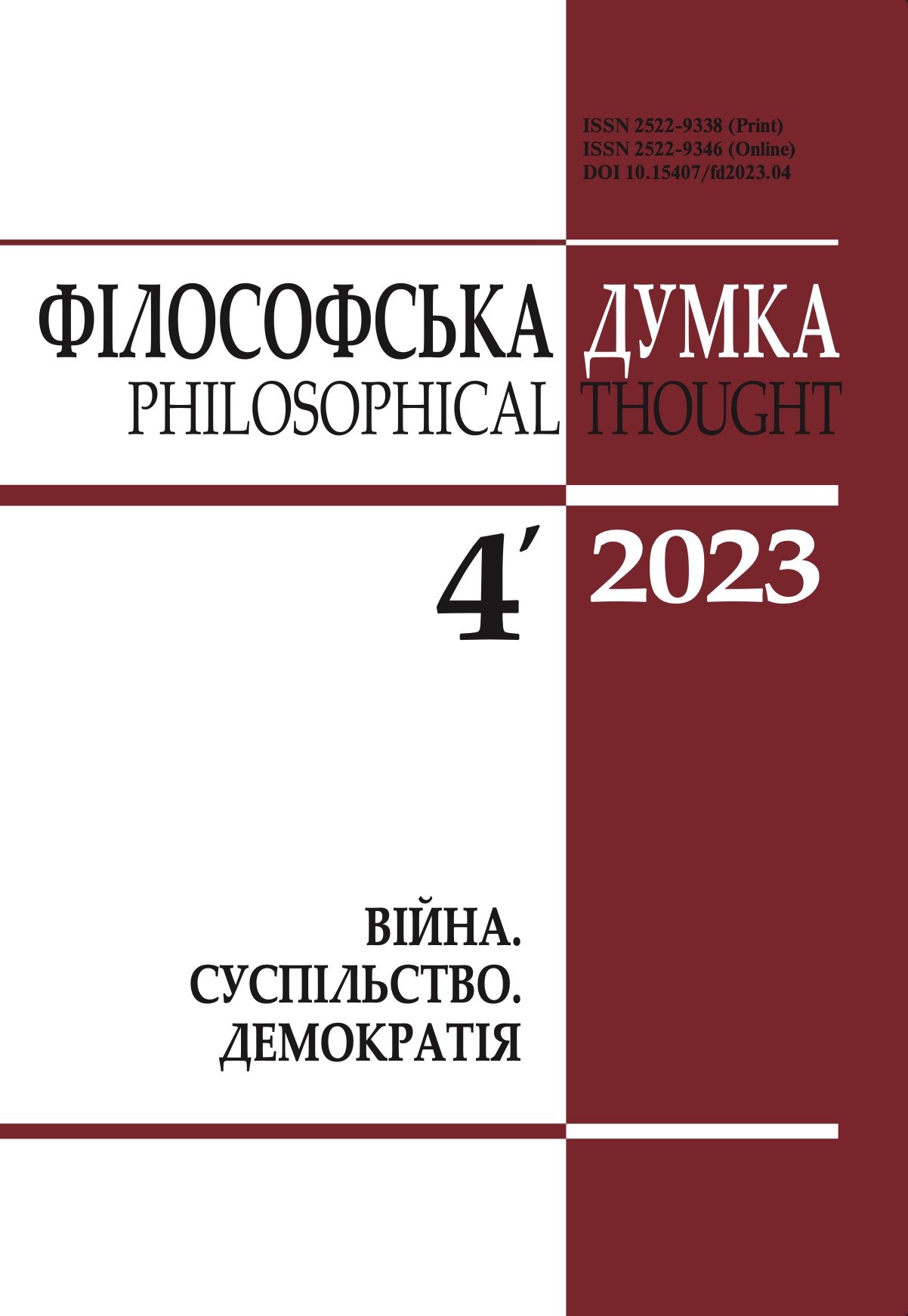INFORMATION WARFARE IN TERMS OF COMMUNICATION THEORY: ATTEMPTED ANALYSIS
DOI:
https://doi.org/10.15407/fd2023.04.021Keywords:
war, information, Internet, mass media, HabermasAbstract
The modern information age brings changes to all phenomena of human life. For example, the natu re of wars change. They are transferred from the actual battlefield to the information space, i.e. they become hybrid. The winner is the one whose narrative becomes dominant in the global information space. The Russian-Ukrainian war is a vivid example of the latest confrontation. It takes place between two absolutely opposite positions, a compromise between which is impossible. This conflict is deeply existential, because Russia sharply denies the existence of Ukraine as an independent state and as a nation in general. This is evidenced by the rhetoric of the aggressor state and numerous war crimes. However, this war is not only between two sides. By denying Ukraine its existence, Russia is also at war with the values that Ukrainians uphold and on the basis of which they strive to build their own country. And these are the values of the free democratic world. Therefore, Russia opposes not only one country, but all those who also share them. That is why the information war begins to reach far beyond the borders of Ukraine. Already today, we can see the influence of Russia, whose propaganda influences the agenda of many leading Western countries. Using both classic mass media (newspapers, radio, television) and new ones (communities in social networks, bloggers, etc.), it intervenes in the global information space. The Internet only further complicates the dissemination of reliable information and promotes propaganda, because now there is almost no control over the flow of information. Habermas states this problem, noting that everyone is now a potential author without editorial control. Therefore, in conditions where the mass media gravitate towards entertainment and most of the information flows in an uncontrolled stream, there is a war for human minds. That’s why the current situation becomes a challenge for communicative theory, which has learned to make a correct diagnosis, but has not yet offered its option for exiting the crisis. Habermas’ post “War and In dignation” is so far only a testimony to the failure of his philosophy in the face of real challenges. Therefore, modern war is also a direct test for communicative theory, which must either find a way out of its limits or confirm its defeat.
References
Bruns, A., Highfield, T. (2017). Is Habermas on Twitter? Social Media and the Public Sphere. In: Enli, G., Bruns, A., Larsson, A.O., Skogerbo, E., & Christensen, C. (Eds.), The Rout ledge companion to social media and politics (pp. 56-73). Routledge (United States of Ame rica.)
https://doi.org/10.4324/9781315716299-5
Bystrytskyi, Ye., Sytnichenko, L. (2020). Filosofia i dyskurs viiny: Konflikt svitiv yak mezha komunikatyvnoi teorii Jurgena Habermasa. [In Ukrainian]. Filosofska dumka, 3, 74-78.
Garnham, N. (1992). The Media and the public sphere. Habermas and the Public Sphere. Ed. by Calhoun, C. Cambridge: MIT Press.
Habermas, J. (2000) Strukturni peretvorennia u sferi vidkrytosti. Per. z nim.: Anatolii Onyshko. [In Ukrainian]. Lviv: Litopys.
Habermas, J. (2022). Reflections and Hypotheses on a Further Structural Transformation of the Political Public Sphere. Theory, Culture & Society, 39(4), 145-171. Retrieved from: https:// journals.sagepub.com/doi/epub/10.1177/02632764221112341
https://doi.org/10.1177/02632764221112341
Habermas, J. (2022). Reflections and Hypotheses on a Further Structural Transformation of the Political Public Sphere. Theory, Culture & Society, 39(4), 145-171. Retrieved from; https://journals.sagepub.com/doi/epub/10.1177/02632764221112341
https://doi.org/10.1177/02632764221112341
Komarek, S. (2020). Yevropa na rozdorizhzhi. [In Ukrainian]. Lviv: Apriori.
Nichols, T. (2019) Dyvanni eksperty. Yak neobmezhenyi dostup do informatsii robyt' nas tupishymy. Per. z anhl.: Yevhenii Kuznietsov. [In Ukrainian]. Kyiv: Nash format.
Pomerantsev, P. (2020). Tse (ne) propahanda. Podorozh na viinu proty realnosti. Per.: O. Forostyn. [In Ukrainian]. Kyiv: Yakaboo Publishing.
Proleiev, S., Bystrytskyi, Ye., Zymovets, R. (2020). Infovlada v globalizovanomu sviti. Komunikatsia i kultura v hlobalnomu sviti (pp.274-383) [In Ukrainian]. Kyiv: Dukh i litera.
Woolley, S.C., Guilbeault, D.R. (2017). 'Computational Propaganda in the United States of America: Manufacturing Consensus Online'. Ed. By S. Woolley, Ph.N. Howard. Working Paper, 2017.5. Oxford, UK: Computational Propaganda Research Project.
https://doi.org/10.1093/oso/9780190931407.001.0001
Yermolenko, A. (2022a). Dyskurs viiny v suchasnii filosofii: mezhi dialohu. In: Katehorii. Za rezultat amy Vseukr. kruhloho stolu «Chytannia pamiati Ivana Boichenka - 2022. Liudyna. Is to riia. Myr i viina» (21 zhovt. 2022). Zbirnyk naukovykh materialiv. Redkol.: A.Ye. Konverskyi ta in. (pp. 3-10). [In Ukrainian]. Kyiv: Znannia Ukrainy.
Yermolenko, A. (2022b). Sprotyv zamist' peremovyn. [In Ukrainian]. Filosofska dumka, 3, 59-63.
Downloads
-
PDF (Українська)
Downloads: 258
Published
How to Cite
Issue
Section
License
Authors who publish with this journal agree to the following terms:
- Authors retain copyright and grant the journal right of first publication.
- Authors are able to enter into separate, additional contractual arrangements for the non-exclusive distribution of the journal's published version of the work (e.g., post it to an institutional repository or publish it in a book), with an acknowledgement of its initial publication in this journal.
- Authors are permitted and encouraged to post their work online (e.g., in institutional repositories or on their website) prior to and during the submission process, as it can lead to productive exchanges, as well as earlier and greater citation of published work (See The Effect of Open Access).


